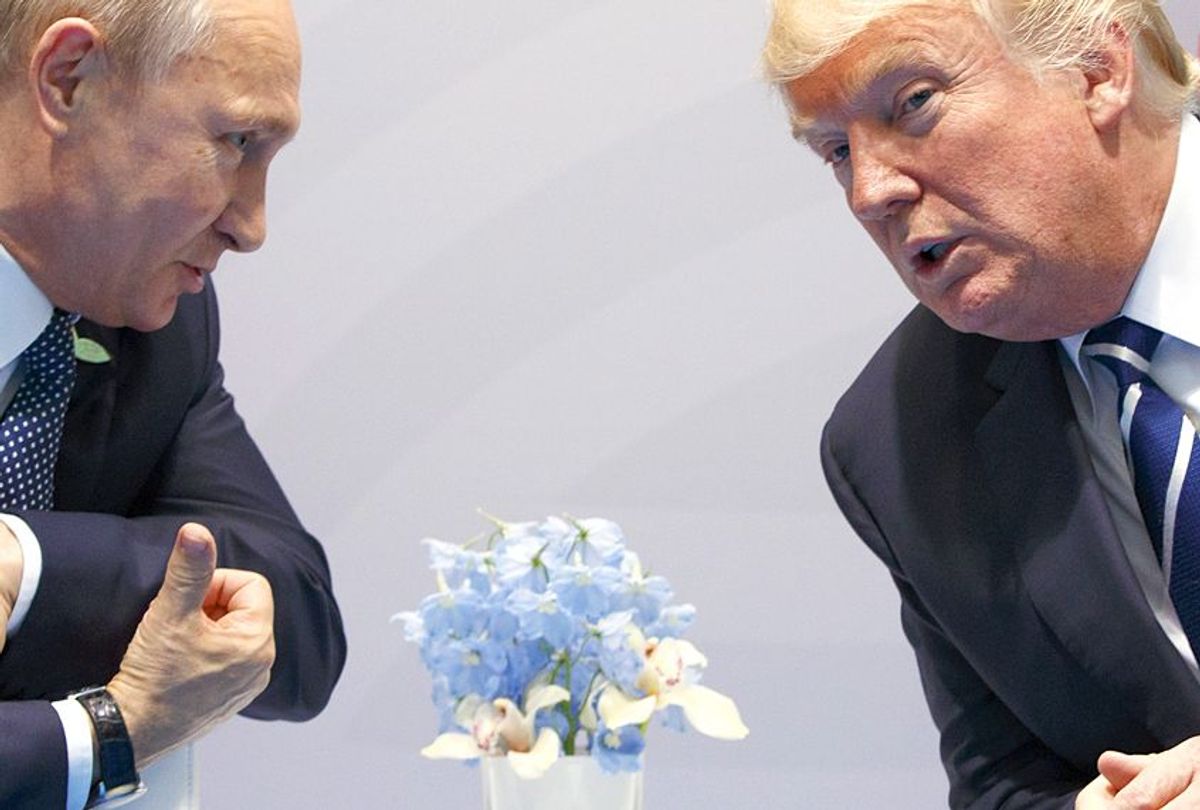After a year in office, President Trump’s man-crush on Vladimir Putin is an unrequited love affair, long on lies, legal charges and unfulfilled promises. While unstinting in his admiration for the Russian president, Trump is ineffectual in delivering the policy results desired by his Moscow penpal.
As the advice columnists say, “Can this relationship be saved?”
The Trump-Putin bromance is no casual fling. A cascade of news reports has documented previously undisclosed contacts between the Trump campaign and Russian officials during the 2016 election. Last month, the Washington Post cataloged dozens of them. On election day, a Trump spokesperson denied any meetings with Russians.
The indictments of Trump’s national security adviser, his campaign manager and deputy, and the staffer who facilitated a meeting with Russian officials provide further evidence of illegal activities by his entourage. Trump responded by calling the Russia investigation "fake news."
Now the Post has documented how Trump consistently rejects what U.S. national security agencies are telling him about Russia's capabilities and intentions to manipulate the U.S. electoral process.
It is, as the Post points out, a situation without precedent in American history — a president who refuses to “accept what even many in his administration regard as objective reality” about the actions of a foreign adversary.
“Rather than search for ways to deter Kremlin attacks or safeguard U.S. elections, Trump has waged his own campaign to discredit the case that Russia poses any threat and he has resisted or attempted to roll back efforts to hold Moscow to account,” reporters Greg Miller, Greg Jaffe and Philip Rucker write.
At the same time, the president has failed to lift sanctions imposed by President Obama and approved of the closing of Russian diplomatic facilities, including its San Francisco consulate, reportedly a locus of Moscow’s U.S. spying operations.
Protecting Vlad
According to the Post, President Trump has:
1. Never convened a meeting of his national security advisers about the question of Russian interference
Told in early January 2017 that members of his incoming Cabinet had already publicly backed the intelligence report on Russian election meddling, President-elect Trump shot back, “So what?” Admitting that the Kremlin had hacked Democratic Party emails, he said, was a “trap.”
2. Rebuked U.S. intelligence officials who provide information on Russia that conflicts with his views
Russia-related intelligence that might draw Trump’s ire is in some cases not raised verbally, a former senior intelligence official told the Post. In other cases, Trump’s main briefer—a veteran CIA analyst — “adjusts the order of his presentation and text, aiming to soften the impact.”
3. Held a private, unscheduled meeting with Putin, without an adviser or U.S. interpreter present, which is unprecedented.
4. Agreed with Putin about the outlines of a cooperative cybersecurity plan, which Sen. Lindsey Graham, R-S.C., described as “pretty close” to “the dumbest idea I’ve ever heard.”
5. Reiterated America’s commitment to the defense of NATO allies in Europe only after National Security Adviser H.R. McMaster pushed him to do so.
6. Offered to return two Russian diplomatic compounds seized by the Obama administration on Moscow's terms and only relented when Congress intervened.
7. Spurned Pentagon proposals to provide lethal weaponry to the Ukraine government, which is fighting Russian-backed separatists.
While no doubt a favor to Putin, rejecting military aid to Ukraine is also a defensible U.S. policy.
Overall, U.S. officials told the Post that the Kremlin believes it got a huge return on its investment in an operation that by some estimates cost less than $500,000 to execute and was organized around two main objectives: destabilizing U.S. democracy and preventing Hillary Clinton, whom Putin despises, from reaching the White House.
“Putin has to believe this was the most successful intelligence operation in the history of Russian or Soviet intelligence,” said Andrew Weiss, a former adviser on Russia in the George H.W. Bush and Bill Clinton administrations who is now at the Carnegie Endowment for International Peace. “It has driven the American political system into a crisis that will last years.”
Alienation of Affection
At the same time, Trump’s failure to lift sanctions has alienated Moscow’s affection.
When Trump reluctantly signed a new set of sanctions overwhelmingly approved by Congress in July, Russian Prime Minister Dmitry Medvedev posted on Facebook that the president had shown “complete impotence, in the most humiliating manner, transferring executive power to Congress.”
In early September, Putin mocked the idea he had a special relationship with the U.S. president with a gendered poke at Trump’s masculinity. Trump “is not my bride,” Putin said, “and I am not his groom.”
Coming from a black athlete or a female senator, such a biting remark would no doubt provoke a presidential tweetstorm. Coming from his Slavic man-crush, crickets.


Shares